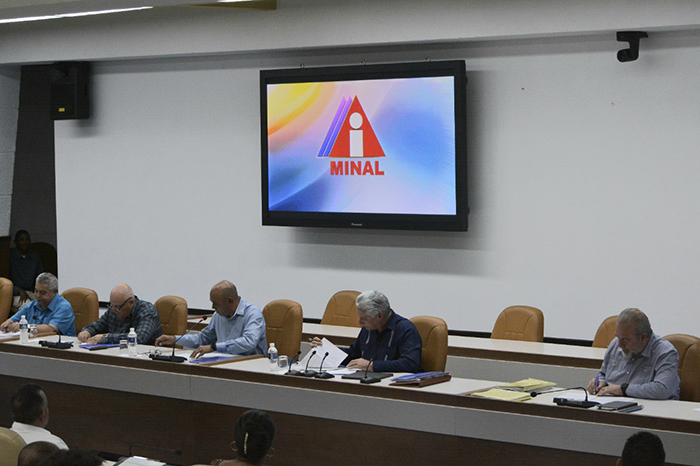
Havana, March 13.- Alberto López Díaz, head of the sector, called in this capital for the stability of the Food Industry and the diversification in the production and supply of food, in his annual work meeting.
With the presence of Miguel Díaz-Canel Bermúdez, First Secretary of the Central Committee of the Communist Party of Cuba (PCC) and President of the Republic, and Manuel Marrero Cruz, member of the Political Bureau and Prime Minister of the Republic, López Díaz emphasized that in the case of the Fisheries Policy, a more flexible nature of fishing activity is required to allow an increase in production.
To this end, the minister proposed the full exploitation of the country's fish farms, production chains with other state entities and with non-state forms of management.
He expressed that through collaboration projects and foreign investment it is possible to acquire national raw materials, develop farming systems with water recirculation and introduce species of high commercial value in the fishing area.
Regarding exports, the head of the Food Industry explained that by 2024, the presence of non-traditional products is expected in the Caribbean market and also in other countries such as Russia, China, Spain, Namibia and Mozambique.
Projections also include the creation of joint ventures in branches such as beverages, chocolate, meat derivatives, cereals and dairy products, he commented.
López Díaz alluded to the fact that in the current year the Ministry of the Food Industry (Minal) will ensure compliance with an important aspect contemplated by the Law on Food Sovereignty and Food and Nutritional Security: strengthening working ties with local governments that It will allow us to take advantage of the endogenous raw materials of each territory, in order to produce new products and diversify food offers to the people.
Regarding the institutional environment, the Minal, as highlighted by the owner, will review and update all the templates of its budgeted units and will perfect those that truly generate income for the country.
The organization will promote exchange with universities and scientific centers aimed at boosting and improving food production, he said.
Reviewing the shortcomings of 2023, the minister stressed that in that period the aquaculture development program - which includes freshwater aquaculture and farmed shrimp - was not fulfilled as a result of the fuel deficit and lack of financing.
He highlighted that there was inefficiency in the registration of producers in the National Registry of Industrial Food and Beverage Producers and that there were violations in the safety requirements that made it impossible for the entities to appear on that list.
López Díaz indicated that in 2023, deliveries of products such as boneless beef, canned meats, chicken, coffee, powdered milk and soy yogurt were affected from the basic-supply rationing.
This instability responds, the minister considered, to the debts owed to the farmers, the low use of their own raw materials and the slowness in the application of the results of scientific research that propose alternative productions and the use of national flours.
Díaz-Canel Bermúdez, for his part, pointed out that currently more than 70 percent of a Cuban family's expenses are for purchasing food, which is a call to all the organizations involved to produce more food, with higher quality and that they reach the people's table.
The president proposed increasing offers not only to reduce high prices, but also because it is a sensitive sector on which each inhabitant of the largest of the Antilles depends.
He urged taking advantage of exports as a source of foreign exchange that allows investing in national productions, as well as using renewable energy, the recycling approach and the circular economy in an area that increasingly requires zero waste.
Marrero Cruz asserted that alliances between the socialist state company and non-state forms of management must translate into the exchange of productive capacities so that the people's demand for food corresponds to the variety of offers.
He noted that given the tense economic scenario that Cuba is experiencing, it is necessary to transform the work with cadres and incorporate young people who bring innovative ideas to benefit the sector.
Also presiding over the annual meeting of the Minal were José Ramón Monteagudo Ruiz, member of the Secretariat of the Central Committee of the PCC; Ulises Guilarte de Nacimiento, member of the Political Bureau and general secretary of the Cuban Workers' Union, and Jorge Luis Tapia Fonseca, vice prime minister of the Republic. (Text and photo: ACN)